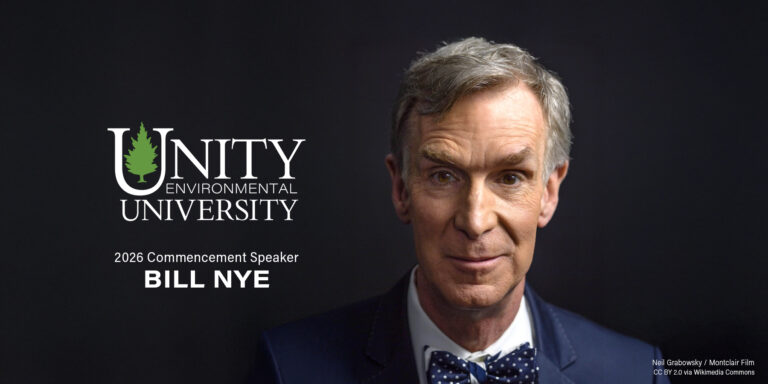TerraHaus, Unity’s new ultra-energy-efficient 10 bed residence hall built to Passive House specifications, has continued to attraction regional and national media attention. The stories have generated enhanced awareness about sustainability among the general public while raising the issue of mitigating global climate change, a key reason to pursue projects such as TerraHaus. As expressed by Unity College President Stephen Mulkey, addressing global climate change is the fundamental challenge of the 21st century. He has framed it as a moral imperative.
Among the most recent stories about TerraHaus is a radio segment that aired on the Maine Public Broadcasting Network (MPBN). As with many stories about TerraHaus, the MPBN story framed the residence hall as being part of a series of steps that can be taken on a broad scale to help mitigate global climate change. Framing the MPBN story is the idea that sustainability solutions to housing college students, for instance, are ready for implementation now, they are not tied to prototype abstractions that are un-reachable for most institutions of higher education, private individuals, public entities or private business interests.
The future of climate change mitigation is here.
On Thursday, September 29, Unity College President Stephen Mulkey, a scientist with significant research experience, and Unity’s Sustainability Coordinator Jesse Pyles, toured TerraHaus with MPBN Reporter Jay Field.
As they toured the house, Mulkey discussed the emerging identity of Unity College, not only as a leader in sustainable practice but with a focus on the emerging field of sustainability science.
In the past, Unity College was far more constrained with respect to the types of campus building and renovation projects that it could reasonably pursue from a budgetary standpoint than it is today. There has been an arc of improvement for energy efficient “green” building and renovations on campus in recent years, and Mulkey is unambiguous about the administrative will to pursue cutting-edge green building practices in the future.
Unity’s first foray into leading edge green building on its campus came in 2008 with the completion of Unity House, the net zero home on campus of the President.
Unity House was the second home designed and constructed by Bensonwood Homes of New Hampshire as part of the groundbreaking Open Prototype Initiative (OPI) at the Massachusetts Institute of Technology School of Architecture. It received LEED Platinum designation, the U.S. Green Building Council’s highest rating for environmentally sustainable construction.
Unity House and TerraHaus are bringing the College even more in line with its environmental identity, focus and mission, Mulkey says.
The College has several key goals at present, Mulkey stressed, including expanding sustainable practice in its new construction and renovation projects.
“If you go green you save money in the long run,” Mulkey stated.
The larger vista of Unity’s sustainability focus relates to sustainability science, an emerging academic discipline of the 21st Century that serves as Unity’s curricular focus.
“The concept of sustainability is infused across our curriculum,” Mulkey explained. Sustainability science addresses a world that is shaped by global climate change. It also addresses how conservation scientists (and a host of environmental professions) effectively manage resources when the climate zones are moving North faster than the lifetimes of trees.
Effectively training tomorrow’s environmental professionals to function in a world besieged by global climate change will require a very different approach of colleges and universities, Mulkey said.
Unity College is a small private college in rural Maine that provides dedicated, engaged students with a liberal arts education which emphasizes the environment and natural resources. Unity College graduates are prepared to be environmental stewards, effective leaders, and responsible citizens through active learning experiences within a supportive community.



